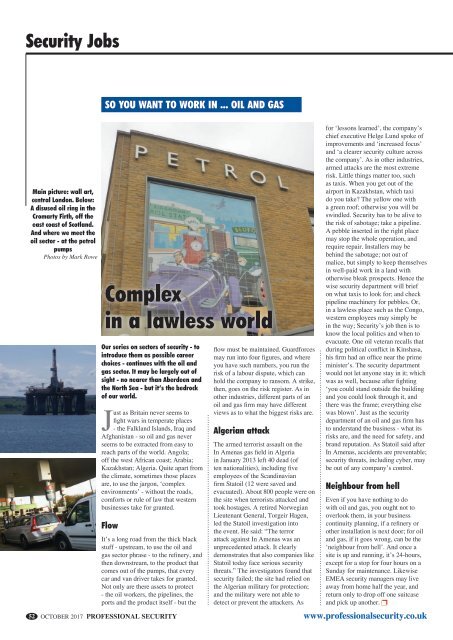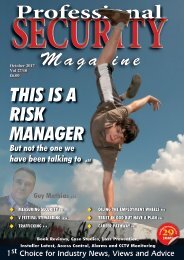27-10draft
Create successful ePaper yourself
Turn your PDF publications into a flip-book with our unique Google optimized e-Paper software.
Security Jobs<br />
so you want to work in ... oil and gas<br />
Main picture: wall art,<br />
central London. Below:<br />
A disused oil ring in the<br />
Cromarty Firth, off the<br />
east coast of Scotland.<br />
And where we meet the<br />
oil sector - at the petrol<br />
pumps<br />
Photos by Mark Rowe<br />
52<br />
Complex<br />
in a lawless world<br />
Our series on sectors of security - to<br />
introduce them as possible career<br />
choices - continues with the oil and<br />
gas sector. It may be largely out of<br />
sight - no nearer than Aberdeen and<br />
the North Sea - but it’s the bedrock<br />
of our world.<br />
Just as Britain never seems to<br />
fight wars in temperate places<br />
- the Falkland Islands, Iraq and<br />
Afghanistan - so oil and gas never<br />
seems to be extracted from easy to<br />
reach parts of the world. Angola;<br />
off the west African coast; Arabia;<br />
Kazakhstan; Algeria. Quite apart from<br />
the climate, sometimes those places<br />
are, to use the jargon, ‘complex<br />
environments’ - without the roads,<br />
comforts or rule of law that western<br />
businesses take for granted.<br />
Flow<br />
It’s a long road from the thick black<br />
stuff - upstream, to use the oil and<br />
gas sector phrase - to the refinery, and<br />
then downstream, to the product that<br />
comes out of the pumps, that every<br />
car and van driver takes for granted.<br />
Not only are there assets to protect<br />
- the oil workers, the pipelines, the<br />
ports and the product itself - but the<br />
OCTOBER 2017 PROFESSIONAL SECURITY<br />
flow must be maintained. Guardforces<br />
may run into four figures, and where<br />
you have such numbers, you run the<br />
risk of a labour dispute, which can<br />
hold the company to ransom. A strike,<br />
then, goes on the risk register. As in<br />
other industries, different parts of an<br />
oil and gas firm may have different<br />
views as to what the biggest risks are.<br />
Algerian attack<br />
The armed terrorist assault on the<br />
In Amenas gas field in Algeria<br />
in January 2013 left 40 dead (of<br />
ten nationalities), including five<br />
employees of the Scandinavian<br />
firm Statoil (12 were saved and<br />
evacuated). About 800 people were on<br />
the site when terrorists attacked and<br />
took hostages. A retired Norwegian<br />
Lieutenant General, Torgeir Hagen,<br />
led the Statoil investigation into<br />
the event. He said: “The terror<br />
attack against In Amenas was an<br />
unprecedented attack. It clearly<br />
demonstrates that also companies like<br />
Statoil today face serious security<br />
threats.” The investigators found that<br />
security failed; the site had relied on<br />
the Algerian military for protection;<br />
and the military were not able to<br />
detect or prevent the attackers. As<br />
for ‘lessons learned’, the company’s<br />
chief executive Helge Lund spoke of<br />
improvements and ‘increased focus’<br />
and ‘a clearer security culture across<br />
the company’. As in other industries,<br />
armed attacks are the most extreme<br />
risk. Little things matter too, such<br />
as taxis. When you get out of the<br />
airport in Kazakhstan, which taxi<br />
do you take? The yellow one with<br />
a green roof; otherwise you will be<br />
swindled. Security has to be alive to<br />
the risk of sabotage; take a pipeline.<br />
A pebble inserted in the right place<br />
may stop the whole operation, and<br />
require repair. Installers may be<br />
behind the sabotage; not out of<br />
malice, but simply to keep themselves<br />
in well-paid work in a land with<br />
otherwise bleak prospects. Hence the<br />
wise security department will brief<br />
on what taxis to look for; and check<br />
pipeline machinery for pebbles. Or,<br />
in a lawless place such as the Congo,<br />
western employees may simply be<br />
in the way; Security’s job then is to<br />
know the local politics and when to<br />
evacuate. One oil veteran recalls that<br />
during political conflict in Kinshasa,<br />
his firm had an office near the prime<br />
minister’s. The security department<br />
would not let anyone stay in it; which<br />
was as well, because after fighting<br />
‘you could stand outside the building<br />
and you could look through it, and<br />
there was the frame; everything else<br />
was blown’. Just as the security<br />
department of an oil and gas firm has<br />
to understand the business - what its<br />
risks are, and the need for safety, and<br />
brand reputation. As Statoil said after<br />
In Amenas, accidents are preventable;<br />
security threats, including cyber, may<br />
be out of any company’s control.<br />
Neighbour from hell<br />
Even if you have nothing to do<br />
with oil and gas, you ought not to<br />
overlook them, in your business<br />
continuity planning, if a refinery or<br />
other installation is next door; for oil<br />
and gas, if it goes wrong, can be the<br />
‘neighbour from hell’. And once a<br />
site is up and running, it’s 24-hours,<br />
except for a stop for four hours on a<br />
Sunday for maintenance. Likewise<br />
EMEA security managers may live<br />
away from home half the year, and<br />
return only to drop off one suitcase<br />
and pick up another. p<br />
www.professionalsecurity.co.uk<br />
p52 Jobs <strong>27</strong>-10.indd 1 16/09/2017 18:33










